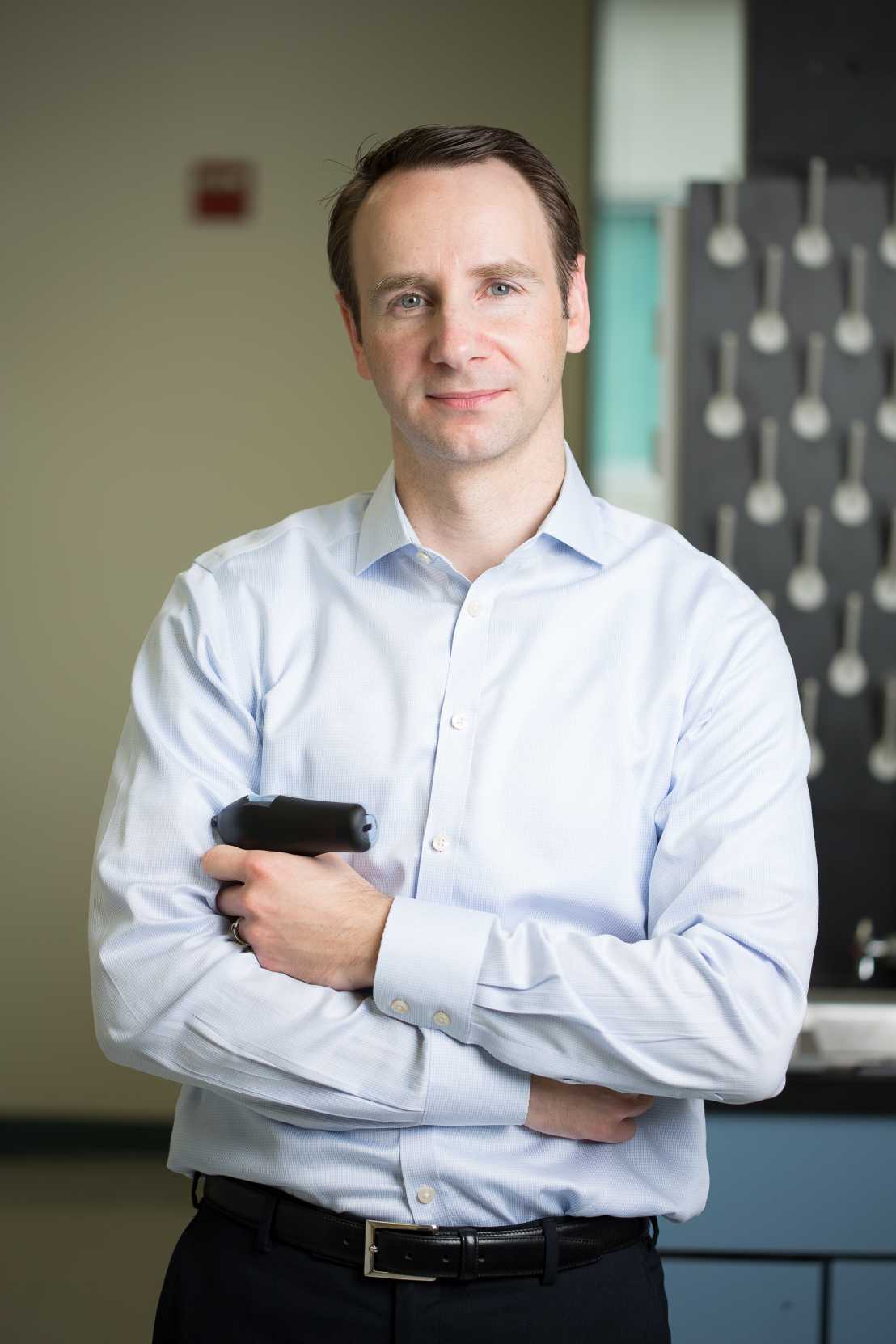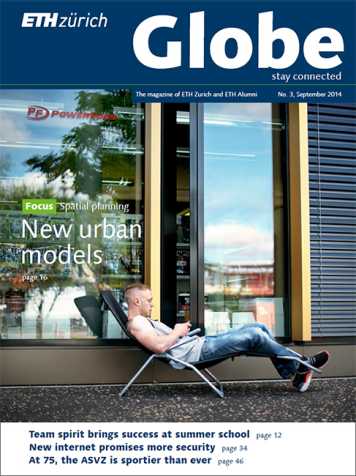Bitten by the business bug
Following his degree at ETH Zurich, Patrick Anquetil set off for Cambridge, Massachusetts to do a PhD. Having settled on the US East Coast, he is currently launching his second start-up business. And he has big plans for it.

Patrick Anquetil – already a serial entrepreneur at the age of 40 and vice president of the New England Chapter of ETH Alumni – exudes an infectious energy. Even if he modestly mentions luck and coincidence when asked about his career so far, he epitomises the good fortune of the brave. He is currently working hard to set up his second company, Portal Instruments, where he is looking to market a revolutionary device that enables users to inject medication without needles.
“It’s incredible!” begins Anquetil. “At 160 years old, the hypodermic needle is probably one of the oldest technologies still in use today.” The simple needle works well for administering drugs. But it can also be dangerous: every year tens of millions of people die worldwide because they use needles incorrectly. And there are also accidents in hospitals, as Anquetil explains: “Although doctors and nurses are perfectly trained in handling needles, they prick themselves once every decade.” These accidents could soon be a thing of the past.
However, the new device, which already works extremely well as a prototype, should also be capable of far more than “merely” injecting active substances into the body. It permits personalised medication and reminds the patients to take their drugs. The device’s sensors also recognise whether the right patient wants to inject the right medication in the right part of the body at the right time.
How did the CEO of Portal Instruments, who studied mechanical engineering at ETH Zurich, come up with the idea? “It was just one of those coincidences”, says Anquetil. In the summer of 2012 his PhD supervisor from MIT, Ian Hunter, contacted him and showed him the needle-free injection technique: “Have a look, and if you like the idea, we’ll start a company.” The graduate leapt at the chance, especially since he “didn’t really have anything more to do” at the first company he had cofounded, as he notes with a wry grin.
When Hunter contacted him, Anquetil was the strategic planning director at SynapDx, a start-up which he had helped to found four years earlier.
This company had developed a molecular diagnostic method that detects genetic markers for autism based on blood tests. It was an instant success: “We raised 45 million dollars in venture capital in the space of three years”, explains Anquetil with pride. Meanwhile, the largest clinical study ever to be conducted in the field of autism diagnostics is currently underway with 800 patients. The company founders and investors hope that relevant data will be found next year that can be used in everyday clinical practice. And now that the study is underway, Anquetil is setting up his second company.
It was always the Frenchman’s dream to become a businessman. Even as a student at ETH Zurich he wrote business plans and submitted them in 1998 to Venture, the business plan competition launched by consulting company McKinsey and ETH Zurich. However, it wasn’t until he joined MIT to do a PhD in 1999 that he was finally bitten by the business bug. “Those were the days when engineers were held in extremely high regard”, says Anquetil, and any kind of research conducted at MIT could have spurred the foundation of a company. “In Ian Hunter’s group, every student was a potential entrepreneur.”
After his PhD, however, Anquetil initially set off on another path. It was a time when investors were interested in nanotechnology. “There was a demand for people like me, who could explain the scientific background to them.” And the then-30-year-old already had eight years of experience in the field: he had attended lectures on the subject in his student days at ETH Zurich. “The fact that ETH Zurich was already offering courses on nanotechnology back in 1996 was really cutting-edge”, he recalls enthusiastically. “When I tell people that here, they don’t believe me!”
With his in-depth knowledge of nanotechnology, he headed to Wall Street for two years. However, he still had a burning desire to start his own company. In order to acquire the basics of business management, he enrolled for an MBA at Harvard University. And while his registration was still being processed, he founded his first company, albeit without much success. Looking back, he describes the endeavour as an instructive experiment.
He then turned his full attention to the MBA degree, where another coincidence would prompt him to found SynapDx. During the second year of the degree, he and two fellow students examined where the best investment opportunities lay in the field of autism and settled on diagnostics. About a year after they had submitted the project, a venture capital company got in touch with Anquetil to inform him that Stanley Lapidus, an authority on diagnostics, had reached the same conclusion. “The investors set up a meeting; we hit it off straight away and founded SynapDx.”
Anquetil can also count on influential partners at Portal Instruments. The pharmaceutical concern Sanofi, which funded the successful research project at MIT, was willing to participate in the start-up. The fledgling company has thus had a financially powerful partner on board from the outset. “But what’s almost uncanny: as it turns out, we have also found the client for the product we’re developing”, reveals Anquetil. After all, in order to be able to inject the substances without a needle, you not only need the device, but also new drugs – which Sanofi is developing in parallel, like a kind of Nespresso system. Seeing as the drug and the device are so closely linked, Sanofi will also sell the devices. “This is a unique launch pad for a start-up company”, says the delighted CEO.
There is still a long way to go before the device can be used. Investors are needed and the American health authorities have to give this novel technology the green light first. But anyone who talks to Anquetil comes away convinced that he will win people over with the product.
As if all that weren’t enough, this serial entrepreneur still finds the time to be involved in ETH Alumni. And he is passionate about his post as vice president of the New England Chapter – because he wants to give something back: “If it hadn’t been for ETH Zurich, none of what I’ve achieved would have happened. I’m absolutely convinced of that.” As he explains, the university taught him the basic principles that enable him to analyse a business idea today. “For that, I will be eternally grateful to ETH Zurich and ultimately to the Swiss people, who paid for my education”, he says.
About Patrick Anquetil
Born in 1973, Patrick Anquetil grew up in Paris. He joined ETH Zurich in 1993, where he earned a degree in mechanical engineering, specialising in robotics. This was followed by a PhD at MIT and an MBA at Harvard Business School. In 2009 Anquetil teamed up with Stanley Lapidus to found a successful start-up company in the autism diagnostics sector. Since 2013 he has been setting up his second company as CEO, developing a device for the needle-free injection of medication. Anquetil is also vice president of the New England Chapter of ETH Alumni.

This article has been published in Globe, no.
3/September 2014:
Read the magazine online or subscribe to the print magazine.
Comments
No comments yet